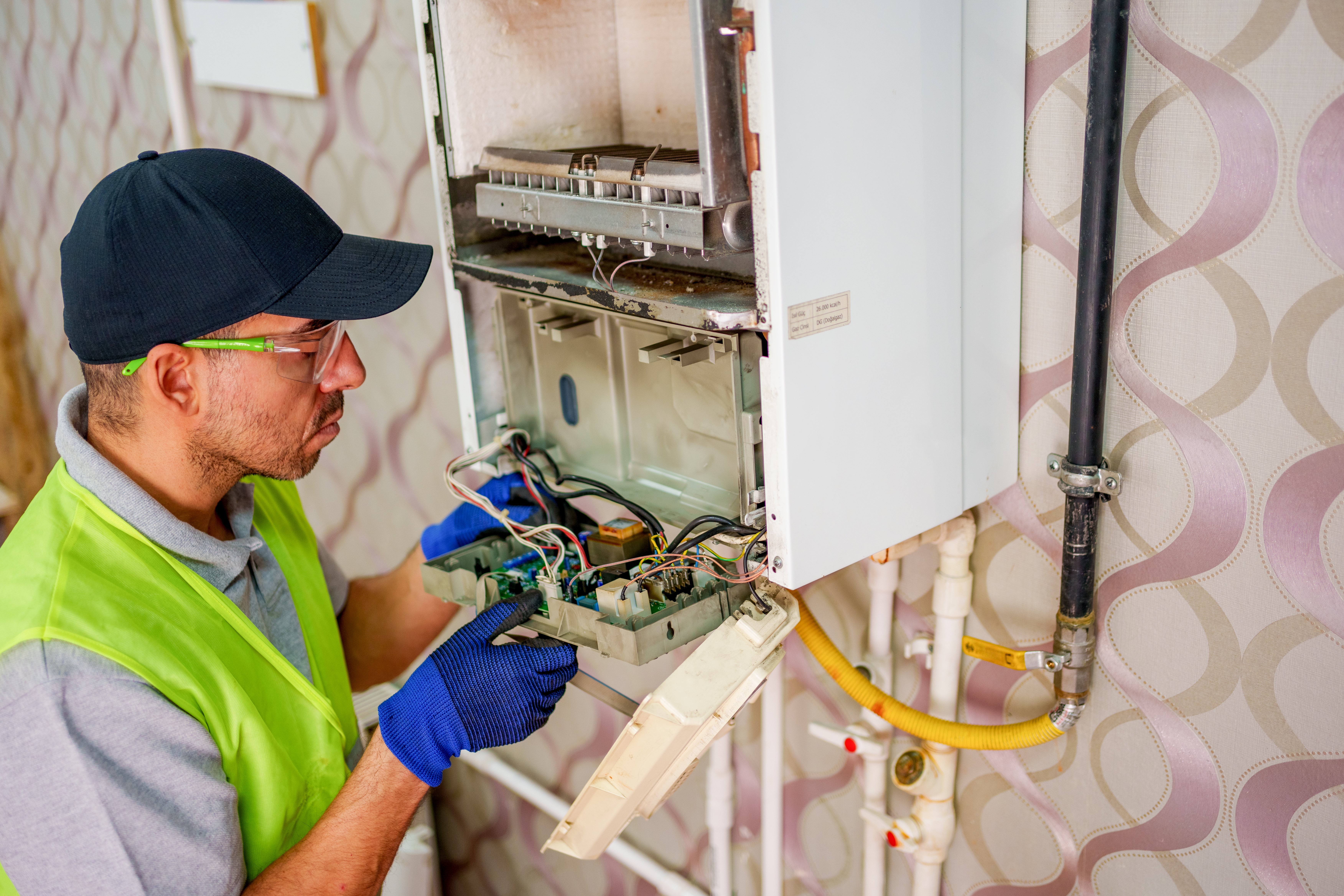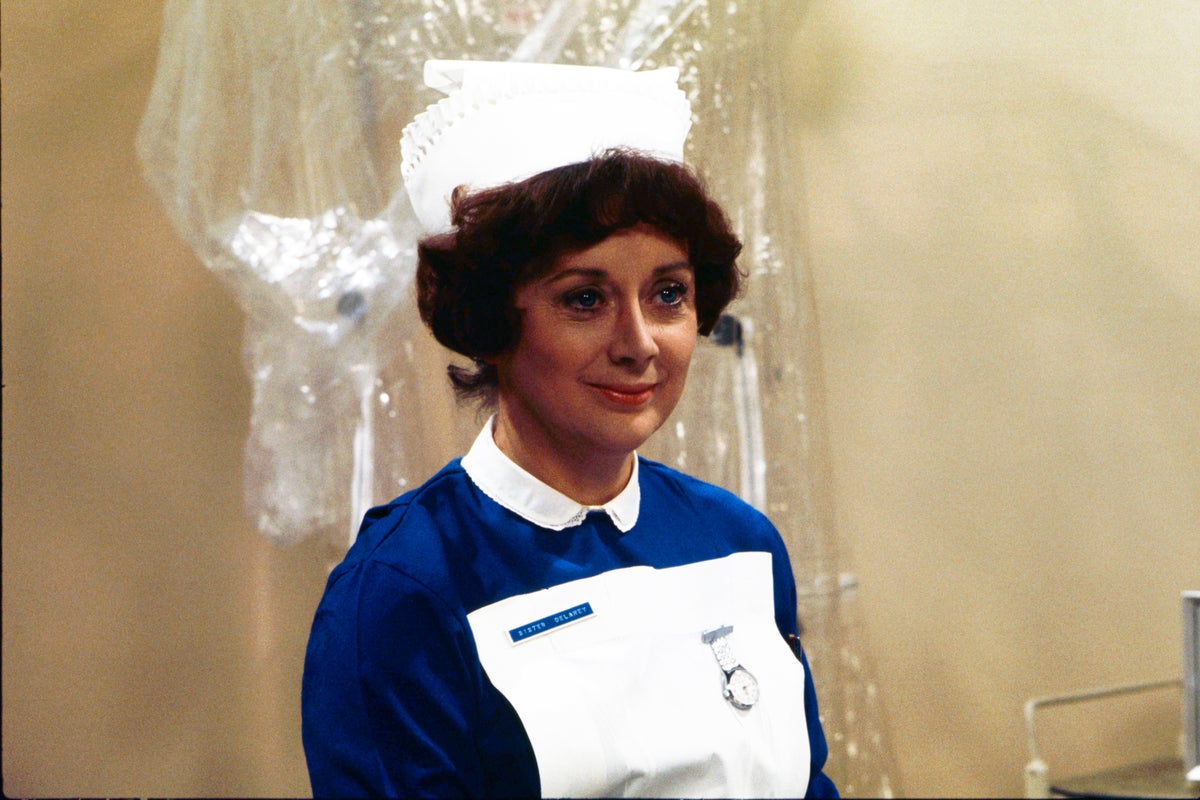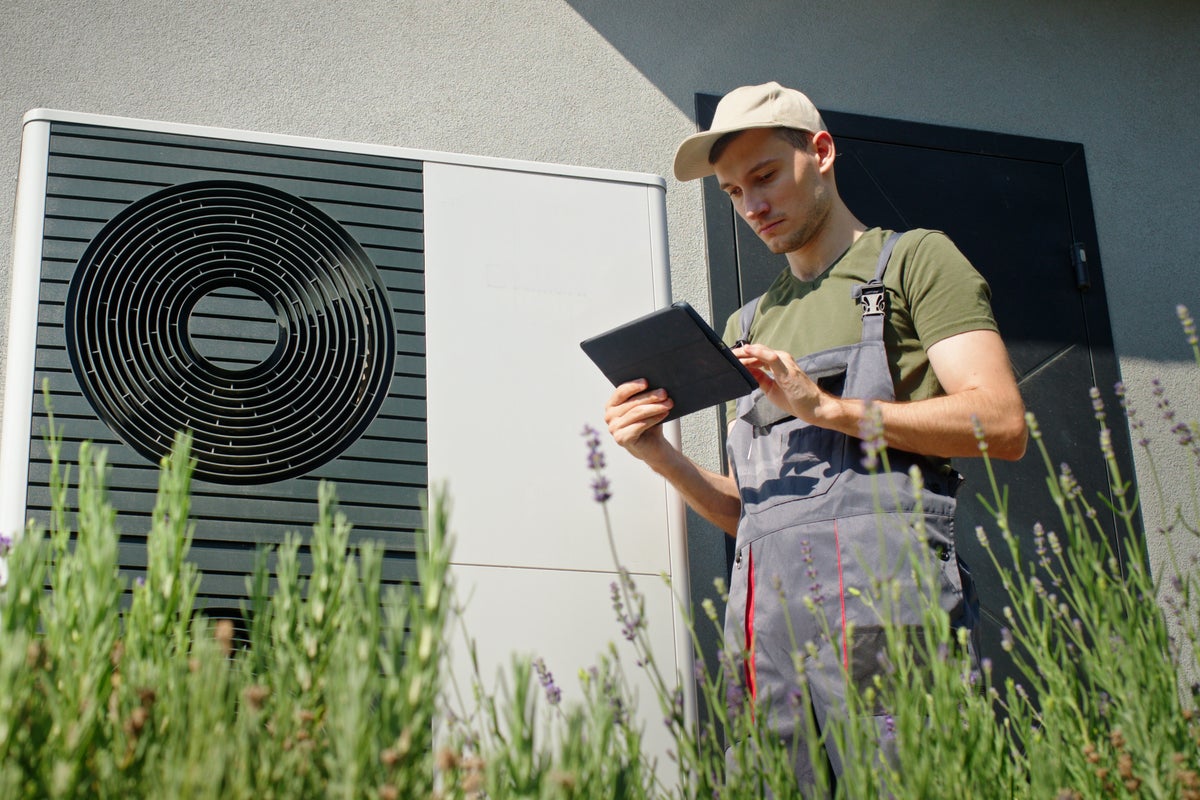Heat pumps have gone from niche technology to national talking point, but are they really worth the money? With conflicting headlines, political arguments and plenty of misinformation, it’s not always clear what applies to real homes and real budgets.
In this guide, we break down how heat pumps work, what they cost to install and run, and when they make financial sense. We also explore whether pairing a heat pump with upgrades like insulation, double glazing or solar panels can improve performance and reduce payback time.
What is a heat pump?
A heat pump is a low-carbon alternative to a gas or oil boiler. Instead of burning fuel, it uses electricity to transfer heat from one place to another. The principle is similar to how your fridge works: a refrigerator removes heat from inside the appliance and releases it into your kitchen. A heat pump does the same process in reverse, extracting warmth from the air or ground outside and moving it indoors to heat your radiators, underfloor heating, and hot water.
Even when the weather is cold, there is still usable heat energy in the air and soil. A heat pump concentrates this energy using a refrigerant fluid and a compressor, then releases it at a higher temperature to warm your home. The colder it is outside, the harder the unit must work, but modern systems are designed to operate efficiently even in sub-zero conditions.
Why heat pumps are replacing gas boilers
- Environmentally friendly: heat pumps don’t burn fossil fuels, so they produce no direct emissions in or around your home.
- Cleaner electricity: as the UK electricity grid adds more renewable power from wind and solar each year, the carbon footprint of heat pumps gets smaller over time.
- Proven technology: just as gas boilers replaced coal fires and coal replaced wood or peat, heat pumps are the next step in home heating and one that supports the UK’s net-zero goals.
Because they are highly efficient, every unit of electricity used to power a heat pump can deliver two to three units of heating energy. That efficiency, combined with government grants, is why many households now ask: are heat pumps worth it?
What are the different types of heat pumps?
When it comes to choosing a heat pump, there are two main types available for UK homes: air source heat pumps (ASHPs) and ground source heat pumps (GSHPs). Both provide renewable heating by transferring existing natural warmth into your property, but the way they capture and deliver that energy is very different.
Air source heat pumps
- These are the most common type of domestic heat pump in the UK.
- They work by extracting heat from the outside air, even in colder weather, and transferring it into your home for central heating and hot water.
- Because they don’t require major groundwork, installation is quicker and usually cheaper than a ground source system.
- Air source heat pumps are often the best choice for smaller properties or households without much outdoor space, though their efficiency can dip slightly during very cold snaps.
Ground source heat pumps
- Ground source heat pumps draw warmth from the soil beneath your garden or driveway, where the temperature remains relatively stable all year round.
- To do this, installers bury a network of pipes, either horizontally in trenches or vertically in boreholes, depending on the space available.
- The installation process is more complex and usually more expensive than fitting an air source heat pump, but once it’s up and running, ground source heat pumps can deliver higher efficiencies and lower long-term energy bills.
- They are best suited to larger homes with outside space and households planning to stay put long enough to benefit from the stronger long-term savings.
Both types of heat pump can significantly reduce your reliance on fossil fuels, cut energy bills, and lower your home’s carbon footprint. The right choice will depend on factors such as your budget, available space, property size, and whether you’re eligible for government incentives such as the Boiler Upgrade Scheme.
Is a heat pump right for me?
Probably. Heat pumps are more expensive to buy since the technology is still quite new, but grants of £7,500 are available.
One of the big attractions of heat pumps is their efficiency. Because they are taking existing heat from outside and concentrating it, they can typically use just 1kw of electric power to provide 3kw of heat. A good gas boiler, by comparison, will use 1kw of gas and supply 0.85kw of heat.
But complicating this maths is the cost of power. Under the July-September 2025 energy price cap, electricity costs 25.73p/kWh compared to gas at 6.33p/kWh or about four times as much.
This is because electricity needs to be generated, sometimes from gas, then distributed along the grid, requiring investment and maintenance.
This means you could end up paying a bit more for the same heat without making the right adjustments to your home and how you use the heat.
To minimise this, you will need a well-insulated home. Cutting draughts and maximising insulation is a good idea anyway, since it will cut your heating bill either way.
Loft insulation and LED lights are the cheapest ways to begin making your home more energy efficient, with wall insulation, double glazing and solar panels being other good options.
According to Callum Medway, head of heating and cooling at green energy fitters Glow Green, it is also important to ensure the radiator temperature is lower since this is more efficient.
Gas boilers often supply water at 60 to 70 centigrade, while he suggests 40 degrees to keep your heat pump efficient.

This means your home will be slower to heat, but with the correct setup, it will still be toasty warm and up to a third cheaper to run than gas.
You could also save if you have solar panels or a solar battery, or both, since you will be making your own electric power and you can buy cheap overnight electricity for about half the usual cost.
There is a learning curve to using a heat pump. People who have had their bills surge have tried to use them like a gas boiler, getting instant heat. This will rip through electric power and leave you poorer. Instead, get a smart thermostat that learns when you are in and can slowly warm the house ready for your arrival.
How do I get a heat pump for my home?
If you’re wondering how to get a heat pump installed, the process is more straightforward than you might think. Many heating engineers and boiler companies are now accredited to fit air source and ground source heat pumps, so you may be able to return to the same trusted firm that last serviced or replaced your boiler.
When choosing a supplier, it’s important to look for an MCS-certified heat pump installer (Microgeneration Certification Scheme). This accreditation ensures that the system is designed and installed to recognised quality standards, which is also a requirement if you want to qualify for government grants such as the Boiler Upgrade Scheme.
These are the steps you should take to get a heat pump for your home:
- Research local installers – Search for “heat pump installers near me” or check the MCS directory to find certified companies in your area.
- Arrange a home survey – A professional assessment will look at your property size, insulation levels, and outdoor space to recommend the most suitable system.
- Get multiple quotes – Prices can vary significantly, so it’s worth comparing at least three quotes. Ask each installer to break down equipment, labour, and any additional costs such as groundworks for a ground source system.
- Apply for funding – In England and Wales, the Boiler Upgrade Scheme currently offers up to £7,500 towards the cost of installing a new heat pump. Scotland and Northern Ireland have their own schemes.
- Book your installation – Once you’ve chosen a provider, they will schedule the work. An air source heat pump typically takes a few days to fit, while a ground source system may require more extensive groundwork and therefore a longer installation time.
By following these steps, you’ll not only find the right installer but also make sure your new heat pump is fitted safely, efficiently, and at the best possible price.
How much does a heat pump cost?
One of the first questions most homeowners ask is: how much does a heat pump cost in the UK? The price of heat pumps can vary depending on the type of system, the size of your property, and how much preparatory work is needed.
- Air source heat pump cost – Typically between £7,000 and £14,000, including installation. These are the most affordable option for most households and the most commonly fitted system.
- Ground source heat pump cost – Usually £18,000 to £30,000, since they require extensive groundwork to lay pipes in the soil. Vertical borehole systems can be even more expensive, though they deliver excellent long-term efficiency.
- Running costs – Heat pumps are highly efficient and can cut your annual heating bills, especially if paired with good insulation and low-carbon electricity tariffs. However, savings will vary depending on your current fuel type (gas, oil, or electric heating).
The National Infrastructure Commission has estimated that, on average, an air source heat pump costs about £10,000 more than a traditional gas boiler. That gap is where government support becomes vital.
Boiler Upgrade Scheme grants
The UK Government’s Boiler Upgrade Scheme offers grants of up to £7,500 towards the cost of installing a new air source or ground source heat pump. To qualify, you’ll need:
- A valid Energy Performance Certificate (EPC) issued within the last 10 years
- No recommendations for loft or cavity wall insulation outstanding on your EPC
- A property that is not a new-build and not social housing
With this support, many households can reduce the upfront cost of an air source system to a level closer to a replacement boiler, making low-carbon heating much more accessible.
FAQs
Do I need new radiators with a heat pump?
“Most properties will need the correct size radiators installed to bring the property up to standard,” said Callum Medway of Glow Green. “New properties built since 2019 should not need any radiator upgrades.”
Are heat pumps noisy?
Rules around heat pumps limit their noise to 42db, or about the same noise a fridge makes.
Can I have a heat pump in a flat?
“This would depend on your outside space, it’s got to go somewhere, which means you probably need to be in the ground floor flat with a garden space,” said Mr Medway.
Should I put a heat pump away from my house at the end of the garden?
“Most go next to the property, which means a cheaper, neater installation; otherwise you have the unnecessary expense of digging trenches for underground pipework,” he said.
Are heat pumps pricier than a gas boiler to fuel?
“This will all depend on the design flow temperature,” said Mr Medway. “We fit as standard a 40 degree flow temp which means it should be 33 per cent cheaper to run than gas. If you have smaller radiators the flow temp will rise which means less efficiency and more cost, we would advise customers to not go above 45 degrees unless they have PV solar, Immersion or batteries to mitigate costs. This of course all depends on how you use the controls.”
How should I use my heat pump to be most efficient?
“The most important function of the heat pump is the Weather Compensation which when set up correctly will automatically use the correct amount of energy that the home needs whatever the external weather conditions,” he said.




